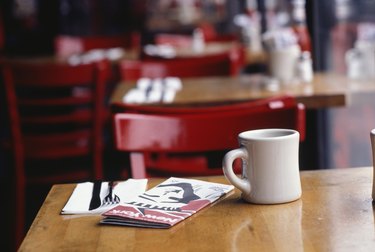
Coffee, tea, soft drinks, chocolate and some medications contain varying amounts of caffeine. While a small amount of this chemical increases your alertness with few noticeable side effects, even a little too much can cause discomfort. Anxiety, shakiness and rapid heart rate, or tachycardia, are among the potential side effects of excess caffeine. In some cases you may need to eliminate caffeine from your diet, but in others, just reducing your intake can prevent unpleasant side effects.
Caffeine and Your Heart Rate
Video of the Day
Caffeine stimulates your nervous system and brain, particularly the cerebral cortex and the brain stem, speeding up certain physical reactions. It also stimulates your heart and dilates your blood vessels, which raises your blood pressure. Even 50 to 300 mg of caffeine, the amount in 1/2 to 3 cups of coffee, increases heart rate and blood pressure. Tachycardia occurs when your heart rate rises above 100 beats per minute. Sensitivity to caffeine varies, so you may experience a heart rate increase from a smaller amount of caffeine than someone else.
Video of the Day
Heart Health Risks
Fatal caffeine overdose is theoretically possible, but for the average man, a fatal dose would require drinking 80 to 100 cups of coffee in a short time, according to Virtual Mass Spectrometry Laboratory. The temporary rise in blood pressure caffeine causes isn't dangerous for most healthy people, according to Duke University Student Affairs. No known link exists between coffee drinking and heart attack. If you already have high blood pressure, however, a further increase in blood pressure may raise your risk of heart attack and stroke. Your caffeine intake is likely excessive if your heart rate consistently rises above 100 beats per minute, you experience heart palpitations or you have other symptoms like restlessness, muscle tremors, rapid breathing or an upset stomach.
Safe Dosage
Pregnant and nursing mothers, people with hypertension and anyone with ulcers or a sensitive stomach should avoid or strictly limit caffeine intake. For most other healthy people, 200 to 300 mg, or around 2 to 4 cups of coffee daily, isn't harmful, according to MayoClinic.com. Consuming more than 200 mg, or around 2 cups of coffee, is more likely to cause negative side effects, however. You may experience mild side effects like restlessness and rapid heart rate from just 1 cup of coffee or tea. Certain medications and herbal supplements including theophylline, echinacea and some antibiotics like ciprofloxacin and norfloxacin can increase the effects of caffeine, making tachycardia more likely. If you take any of these, talk to your health care provider about how much caffeine is safe for you.
Cutting Back on Caffeine
Reducing your caffeine intake can help alleviate your tachycardia and other negative symptoms. To reduce risk of withdrawal symptoms, lower your caffeine intake gradually. Drink one less cup of coffee each day or avoid caffeine later in the day. To reduce the caffeine content in your coffee or tea, brew the drinks for less time than usual. Opt for decaffeinated coffee and tea or caffeine-free soft drinks and herbal teas over caffeinated varieties. Some medications, such as pain relievers, contain up to 130 mg caffeine. When you use medications, choose caffeine-free products.